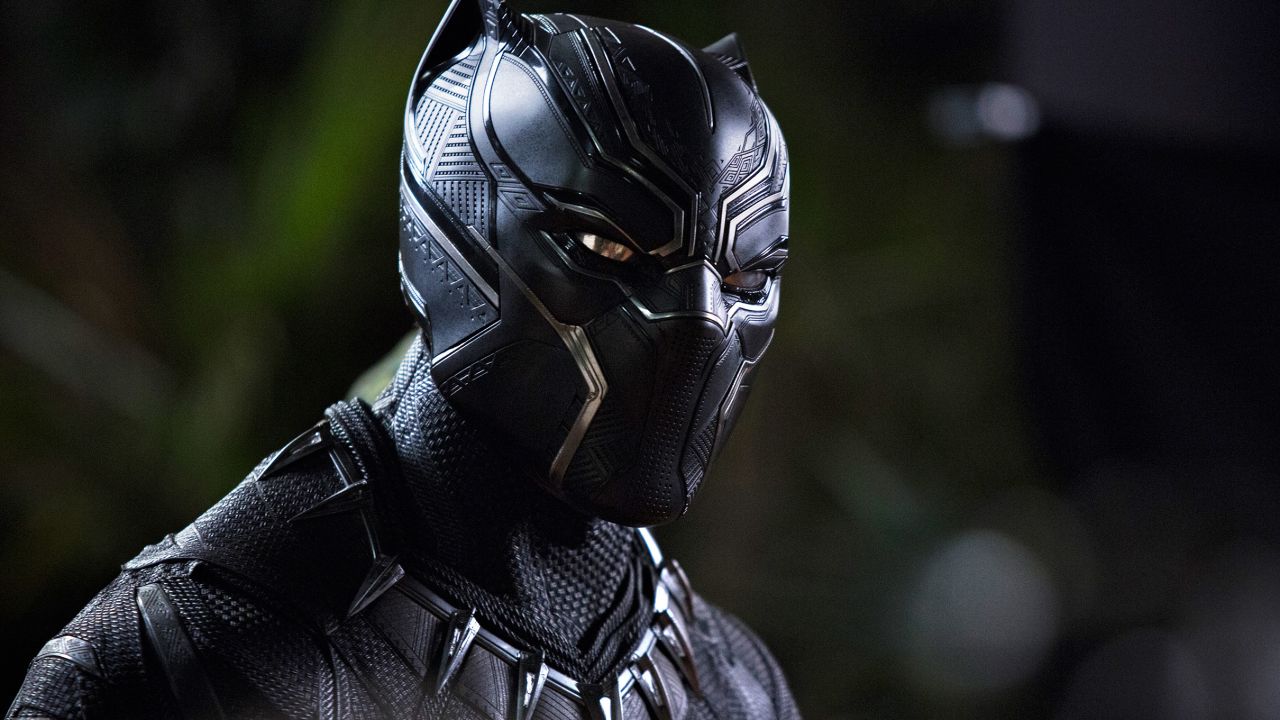T’Challa is a young prince who also happens to be heir to the throne of Wakanda, a Third World African country that’s among the poorest nations on Earth.
At least, it seems that way.
Hidden within the jungles of fictional Wakanda is a rich, technologically advanced city that boasts towering skyscrapers, futuristic airplanes and magical weapons. It’s all powered by “vibranium,” an other-worldly metal that explorers and villains alike have sought for centuries. The peaceful Wakanda just happens to have the world’s largest vibranium mine.
Although most of the world knows nothing about Wakanda’s wealth, a handful of villains do know about it – and their lust for vibranium leads to the killing of T’Challa’s father, the king.
Now on the throne, T’Challa is given the crown and the name “Black Panther” – the title inherited by every Wakandan ruler. He also inherits a ton of perks, including the Black Panther superhero suit and the just-invented black panther shoes (they’re cat-like quiet!).
The future for the selfless and peace-loving T’Challa seems bright – that is, until a long-lost relative shows up and demands that T’Challa step aside so the weapons can be used to start a worldwide racial war. Will T’Challa prevail against this threat?
It’s all part of the new Marvel film Black Panther (PG-13) starring Chadwick Boseman (42) as T’Challa/Black Panther; Michael B. Jordan (Fantastic Four) as his nemesis, Erik Killmonger; Letitia Wright (The Commuter) as T’Challa’s brilliant younger sister, Shuri; and Andy Serkis (Planet of the Apes series) as Ulysses Klaue, a villain.
Black Panther is getting rave reviews, and rightfully so. It’s a fun film that breaks the mold on Marvel movies. In a multicultural society, we need superheroes from different cultures. But while much of the attention has highlighted the race and African heritage of these new superheroes, we shouldn’t overlook the other ways they differ from most other Marvel superheroes. Gone are the sarcastic one-liners and the playboy qualities found in some of the most popular superheroes. Instead, we get a mature superhero in the Black Panther who is full of mercy and altruism – on the individual and national level. No doubt, other Marvel heroes have exhibited compassionate qualities, but in the Black Panther they are more evident. This is one reason Black Panther is near the top of my favorite Marvel films.
Here’s more good news for families with children: The film contains less language and sexuality than most other Marvel films. The caveat: The violence is excessive.
Let’s examine the details:
Warning: minor spoilers!
Violence/Disturbing
Excessive. It might be the most violent PG-13 Marvel movie yet. The film opens with a gun fight and gives us another gun fight minutes later that includes fighting and people being stabbed with spears. We see a lady pass out/die from food poisoning. Security guards are shot dead at point-blank range. Black Panther gets involved in several close (and lengthy) hand-to-hand fights that result in bloodied faces. We watch an intense car chase through city streets that includes gunfire. A bad guy shoots and kills someone at close range; we see blood on the shirt. Two characters get into a sword fight; someone is speared. A bad guy puts his hand around a woman’s throat and lifts her into the air; she doesn’t die. The movie ends with a battle that involves lots of gunfire and fighting, including people being stabbed with spears and knives (although it remains mostly bloodless).
Sexuality/Sensuality/Nudity
Minimal/moderate. Throughout the film we see African women in belly-revealing outfits, and a few men without their shirts. We see African women dance. A couple of women wear somewhat low-cut dresses. We see characters kiss twice.
Coarse Language
Minimal. He—(4), s—t (3), a—(1). (None by Black Panther.)
Other Positive Elements
Black Panther shows mercy on multiple occasions, refusing to kill people when he can, even though they’re his enemies. He also displays a deep love for his countrymen, not wanting to see them harmed.
Other Stuff You Might Want To Know
Black Panther’s sister jokingly flips him off. One scene takes place in a casino where whiskey and alcohol are consumed.
For Black Panther to remain on the throne, he must physically beat any challengers.
Life Lessons
The movie gives us life lessons on self-sacrifice (Black Panther, his family, others), mercy (Black Panther), the desire for peace (Wakanda, Black Panther), and outreach to the poor (Black Panther). It also tackles issues related to foreign aid and the refugee crisis. (Some people in the film want Wakanda to change its isolationist policy.)
Worldview
T’Challa and his people practice a form of ancestral worship.
“Praise the ancestors,” we hear several times.
The Wakandan people even perform a ceremony that allows T’Challa to visit and talk to his deceased father. Another character does something similar later in the film.
If you have children, this might be worth a post-movie discussion. Scripture says we are to worship God alone and that when we die, our spirits go either to heaven or hell. Jesus is our lone intercessor (1 Timothy 2:5-6).
Sponsors
The drink company Brisk is the most well-known movie partner for kids.
What I Liked
The landscapes. The music. The story. The compassion for others shown by Black Panther.
What I Didn’t Like
The excessive violence. The gunfighting seemed more in line with a James Bond film, not a superhero flick.
Discussion Questions
- How is Black Panther different from other superheroes?
- Is Black Panther’s desire for peace naïve?
- What did you think of Erik Killmonger’s goal for the weapons?
- What would you say to someone who told you they pray to their ancestors?
- What did you think about the controversial decision T’Challa’s father made?
Entertainment rating: 3.5 out of 5 stars. Family-friendly rating: 3 out of 5 stars.
Rated PG-13 for prolonged sequences of action violence, and a brief rude gesture.
